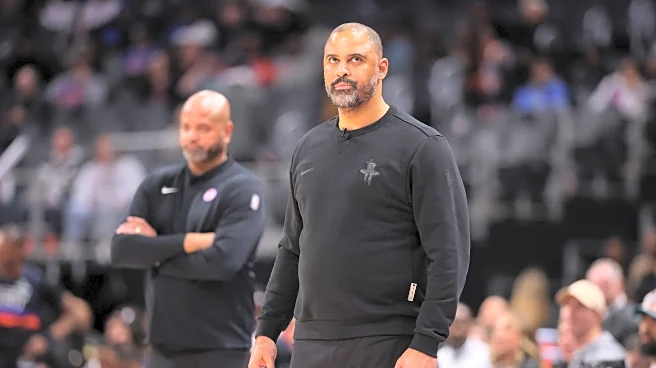What's Happening?
UCLA quarterback Nico Iamaleava has expressed his enthusiasm for working with assistant coach Jerry Neuheisel, who recently took over play-calling duties. Iamaleava first met Neuheisel during his high school recruitment trip and was familiar with his coaching style. Neuheisel was assigned play-calling responsibilities just days before UCLA's game against Penn State, a team known for its strong defense. Despite the short preparation time, Iamaleava excelled, throwing for 166 yards and two touchdowns, and rushing for 128 yards and three touchdowns. His performance was instrumental in UCLA's 42-37 upset victory over Penn State, marking the team's first win of the season after a challenging start.
Why It's Important?
The change in play-calling has revitalized UCLA's football team, which had been struggling with an 0-4 start. The victory against Penn State not only broke their losing streak but also showcased the potential of Iamaleava under Neuheisel's guidance. This development is significant for UCLA as it could signal a turning point in their season, boosting team morale and potentially improving their standings. The successful collaboration between Iamaleava and Neuheisel may influence future coaching strategies and decisions within the team, impacting their performance in upcoming games.
What's Next?
UCLA will need to maintain the momentum gained from their victory against Penn State. The team, under interim head coach Tim Skipper, will focus on sustaining the enjoyment and success brought by Neuheisel's offensive changes. As the season progresses, UCLA will face more challenging opponents, and the effectiveness of Neuheisel's play-calling will be tested further. The team's ability to adapt and continue performing at a high level will be crucial in determining their overall success this season.
Beyond the Headlines
The shift in coaching dynamics at UCLA highlights the impact of leadership changes on team performance. Neuheisel's approach has not only improved the team's offensive strategy but also restored a sense of enjoyment and confidence among players. This case underscores the importance of adaptability and innovation in sports coaching, which can lead to significant improvements even in difficult circumstances. The broader implications may include a reevaluation of coaching roles and strategies in college football, emphasizing the need for flexibility and responsiveness to team needs.











